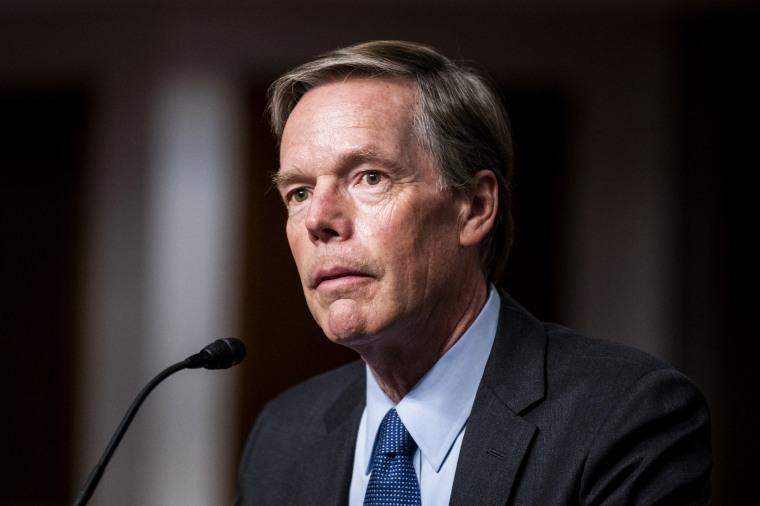風蕭蕭_Frank
以文會友美駐華大使呼籲中美恢複對話,美媒:拜登政府急了
(觀察者網訊)據美國有線電視新聞網(CNN)當地時間2日報道,美國駐華大使伯恩斯稱美國從未打算“冰凍中美關係”,隨時準備好與中國舉行高層對話,希望能在兩國間建立更好的溝通渠道一事上與中方達成共識。
全國廣播公司(NBC)稱,伯恩斯的發言是迄今為止“最明確的信號”,顯示出拜登政府對恢複中美對話的“渴望”。
當地時間周二,美國駐華大使伯恩斯通過視頻連線出席華盛頓智庫史汀生中心(Stimson Center)座談會。他在會上表示,美國已經準備好與中國舉行高層會談,並希望能在這一問題上與中方達成共識。
伯恩斯說,中美關係仍是複雜又充滿競爭性的,但華盛頓不尋求與北京發生衝突,並相信更多的對話將會是建設性的,兩國政府之間需要更好且更深入的溝通渠道。
伯恩斯還稱,美國務卿布林肯原定於今年2月但一再推遲的訪華行程將被重新安排,“當他的訪問條件合適時。”
但他表示,目前仍無法預測中美兩國何時會同意重新安排此次訪問,也無法預測其他美國政府官員與中方官員之間的會晤情況,“我們真正需要的是政府高層更廣泛的接觸,美國已經為此做好準備,希望中方也準備好了。我們從未支持冰封中美關係。”
伯恩斯稱,在中美關係出現問題時,保持對話溝通尤為重要,“我們從不避諱對話,我們希望中國在這個問題上與我們是相向而行的。”
另據路透社報道,伯恩斯在會上還提到美國應與中國增加學生交流,稱這符合美國的國家利益。
他表示,美國年輕人應該學習中國的語言、文化和曆史,這樣才能在日後任職於政府部門時對中國有更好的認識,正如他被任命為駐華大使後便給自己定下了學習中文的目標。
伯恩斯聲稱,中國過去3年嚴格的疫情防控措施“阻礙”了兩國人員接觸,如今管控措施悉數取消,希望各項正式和非正式交流都能恢複如初,“在過去三年裏,兩國社會出現了脫節,這不健康也不明智。”
NBC稱,美國駐華大使的言論是迄今為止“最明確的信號”,表明在中美關係緊張局勢下,拜登政府渴望與中國恢複更廣泛的對話。
盡管伯恩斯表達了美方對恢複中美對話的迫切,但其發言還是將對話中斷的責任怪在中方頭上。
伯恩斯雖一再稱中美建立和加強可靠的溝通渠道很有必要,但同時又聲稱自時任國會眾議長佩洛西竄台、“流浪氣球”事件後,中國暫停了與美溝通的許多重要渠道,美方多次呼籲重啟對話無果。
話裏話外都是中方對美方不予理睬,卻隻字不提明明是美方挑釁炒作在先,中方才做出相應反應。
4月11日,中國外交部發言人汪文斌在記者會上指出,當前中美關係遭遇困難,責任不在中方。
他表示,美方應停止幹涉中國內政,停止損害中國利益,停止一邊聲稱要為中美關係加裝“護欄”、一邊破壞兩國關係的政治基礎,(應)同中方相向而行,推動中美關係重回健康穩定發展正軌。
在布林肯於G7外長會上發表“中國必須表現出繼續與美國接觸的意願”等荒謬言論後(18日),汪文斌再度回應表示,中國始終按照相互尊重、和平共處、合作共贏三原則,看待和發展中美關係。當前中美關係緊張的根源,在於美方基於錯誤的對華認知,製定和執行錯誤的對華政策。
中國始終對中美對話持開放態度,希望能夠和美國加強高層對話,但是美國卻做出各種對華充斥著敵意的行為,此舉才是真正在破壞中美對話的環境。
4月21日,中國前駐美大使崔天凱在“中國式現代化與世界”藍廳論壇指出,中美進行對話有兩個前提條件,分別是尊重彼此和言而有信,“不對話肯定解決不了問題。但對話如果沒有誠意,不能平等相待,也不見得能解決問題。”
U.S. ambassador to China says the U.S. is ready for high-level talks with Chinese
The U.S. relationship with China remains “complicated” and competitive, but Washington does not seek conflict with Beijing and believed more dialogue would be constructive, said U.S. Ambassador Nicholas Burns.
“Our view is we need better channels between the two governments and deeper channels, and we are ready to talk,” said Burns, speaking virtually at an event organized by the Stimson Center, a think tank in Washington.

Nicholas Burns testifies during his confirmation hearing for ambassadorship to China in the Senate Foreign Relations Committee on Oct. 20, 2021.Bill Clark / CQ-Roll Call via Getty Images file
“And it’s particularly important to do that, of course, when you’ve got big problems and when you have major disagreements in the relationship. We’ve never been shy of talking, and we hope the Chinese will meet us halfway on this,” Burns said.
The ambassador’s comments are the clearest signal yet that the Biden administration is keen to restore a broader dialogue with China amid tensions over Taiwan, trade and a Chinese balloon that entered U.S. airspace.
Zelenskyy has 'long and meaningful' call with China's president
APRIL 26, 202301:34Diplomatic channels between China and the U.S. have withered over two successive administrations, with Beijing so far unwilling to say when top U.S. officials from the Biden administration will be welcome for high-level meetings.
Western officials and former U.S. diplomats say China’s neighbors and U.S. allies worry the breakdown in communication between the world’s superpowers could derail the global economy or lead to an accidental clash.
Secretary of State Antony Blinken was scheduled to visit China in February but canceled his trip after the Chinese balloon, which U.S. officials said was designed to eavesdrop over American territory, traversed the U.S. before it was shot down by a U.S. fighter jet off South Carolina.
China has said that the balloon was for meteorological research and that the U.S. is responsible for tensions. The Chinese embassy in Washington did not immediately respond to a request for comment.
Burns said he could not predict when China and the U.S. would agree on rescheduling Blinken’s visit or on talks between other U.S. cabinet officials and their Chinese counterparts.
“What we really need is a more broad-based engagement at the Cabinet level, and the United States is ready for that,” Burns said. “So we hope that the government here will be ready as well. And it’s hard for me to predict at this point when this kind of re-engagement will reoccur, but we have never supported an icing of this relationship.”
Discussions between U.S. climate envoy John Kerry and his Chinese counterpart have resumed, but other communication channels remain dormant, including possible talks on the role of Chinese black market firms shipping precursor chemicals for fentanyl into the United States, Burns said.
“We have not had a productive exchange on the fentanyl issue,” he said.
Burns, who has held senior positions at the State Department, said China’s strict “zero Covid” policies over three years also hampered official and informal contacts between U.S and Chinese executives, lawmakers and academics.
Now that the quarantine restrictions have been lifted, Burns said he hoped those informal meetings and exchanges would resume to previous levels.
“We didn’t see a single CEO of a major company here until just six weeks ago. And we didn’t see and haven’t seen members of Congress travel here because of the onerous restrictions under zero Covid,” the ambassador said.
He said there are about 295,000 Chinese students studying in the U.S., but only 350 American students in China.
“We’ve had a decoupling of our societies over the last three years," Burns said. "It’s not healthy. It’s not smart."
Burns was not able to formally present his credentials as ambassador until last month, because of the Covid restrictions.
Dan De Luce is a reporter for the NBC News Investigative Unit.
 Abigail Williams, a producer and reporter for NBC News covering the State Department.
Abigail Williams, a producer and reporter for NBC News covering the State Department.




